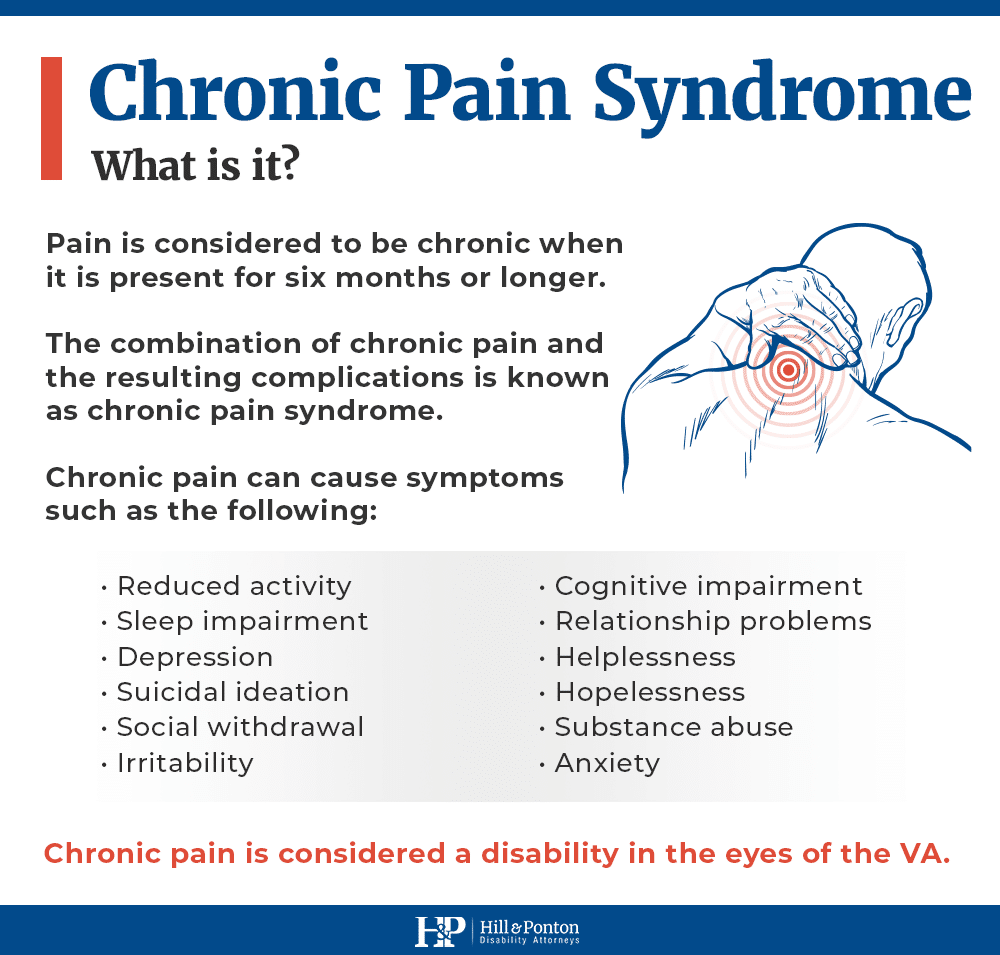Chronic pain can result from a number of injuries or conditions, making activities of daily living more challenging. If you were injured or fell ill due to military service, you may be eligible for veterans’ benefits through the United States Department of Veterans Affairs. However, obtaining an accurate rating for chronic pain isn’t always as straightforward as it is for other conditions.
If you’re a disabled veteran seeking VA disability benefits for chronic pain, there are some key steps you should take. This guide will break down how the VA rates chronic pain when awarding veterans disability benefits.
What Is Chronic Pain?
Pain is considered to be chronic when it is present for six months or longer. Chronic pain usually begins with an injury or illness and can end up causing complications. Unfortunately, these complications can, in turn, make the chronic pain even worse. The combination of chronic pain and the resulting complications is known as chronic pain syndrome. A veteran with chronic pain frequently develops problems beyond the physical pain they endure. Chronic pain can cause symptoms such as the following:
- Reduced activity
- Sleep impairment
- Depression
- Suicidal ideation
- Social withdrawal
- Irritability
- Memory and cognitive impairment
- Relationship problems
- Helplessness
- Hopelessness
- Substance abuse
- Anxiety

As the above list of symptoms shows, veterans with chronic pain suffer from more than physical pain. This is backed up by multiple medical studies proving that chronic pain has a direct effect on the brain. These studies have looked at how the persistent perception of pain interferes with the natural balance of activity in someone’s brain. Chronic pain can result in anxiety, mood disorders, and cognitive impairments such as difficulty concentrating, difficulty focusing, and difficulty making decisions. The physical pain and resulting secondary problems associated with chronic pain significantly diminish a person’s quality of life.
Is Chronic Pain a Disability?
Yes, chronic pain is a disability. But it wasn’t always that way in the eyes of the VA.
In the past, veterans were often unable to seek disability compensation for their chronic pain. But this changed with a 2018 court case.
Saunders v. Wilkie
For years, the VA has denied service-connected claims of impairment caused by pain alone, if the pain was not a symptom of a diagnosed condition or disease. That is, not until a recent game-changer April 2018 Federal Circuit decision – Saunders v. Wilkie. [Saunders v. Wilkie No. 17-1466 (Fed. Cir. 2018)]
According to the VA’s code and regulations, basic entitlement for compensation must result from “personal injury suffered or disease contracted in line of duty, or for aggravation of a preexisting injury suffered or disease contracted in line of duty…” [38 USCS § 1110].
In Saunders, the Veteran filed a claim for pain from a bilateral knee disorder. During service, she was diagnosed with patellofemoral pain syndrome. VA denied her claim relying on years-long standing Veterans Court’s ruling in Sanchez-Benitez v. West explaining that “pain” could not be provided as a diagnosis and that Saunders had not demonstrated a currently diagnosed bilateral knee condition that could be linked to service. [Sanchez-Benitez v. West, 13 Vet. App. 282, 285 (1999)]
Saunders appealed that the Board erred legally in its interpretation of what constitutes a “disability” under 38 USCS § 1110. The question which the Federal Circuit resolved was whether Saunders’s patellofemoral pain syndrome is a “disability”.
The Federal Circuit concluded that the term “disability” refers to a condition that impairs normal functioning and reduces earning capacity. As such, “pain” is impairment because it diminishes the body’s ability to function. The Federal Circuit explained that medical literature and common sense supported the assumption that chronic pain can develop in the absence of gross skeletal pathology, and common causes like muscle strain and inflammation may be difficult to detect with diagnostic imaging such as MRIs or X-rays.
To summarize, this case determined that veterans could seek disability compensation for their chronic pain if the pain was service connected. This is true whether or not the veteran knows the exact source of the pain.

What Is the VA Rating for Chronic Pain?
Veterans looking for a VA chronic pain rating may only be rated for disabilities caused or aggravated by the pain – such as depression under 38 CFR § 4.130 (the General Rating Formula for Mental Disorder).
VA does not have a specific diagnostic code for chronic pain. So, veterans don’t receive a VA disability rating for chronic pain specifically. In order to receive VA disability compensation for chronic pain, the symptoms caused by the chronic pain disorder must be ratable.
Keep in mind that, in order for symptoms of chronic pain syndrome to be ratable, the source of the chronic pain must have a service connection. For example, a veteran with a service-connected back condition suffers from chronic pain. The chronic pain causes the veteran to become severely depressed. Because the chronic pain developed out of a service-connected condition, the veteran can receive VA benefits for the depression caused by his chronic pain. In other words, the depression is secondary to the veteran’s service-connected condition.
Chronic Pain VA Claims
One of the most helpful things a veteran can do for their claim is to get a private doctor to write a medical opinion. VA disability claims involving chronic pain often benefit from a medical opinion from a private health care professional due to the complexity of the medical condition. This opinion can serve as valuable medical evidence in the claim.
The doctor should discuss the medical research regarding the effect chronic pain has on the brain. Make sure the doctor specifically relates any symptoms of chronic pain to a service-connected condition. For example, if a veteran has a back condition that is service connected, and a shoulder condition that is not service connected, the doctor needs to specifically relate any symptoms associated with chronic pain to the veteran’s service-connected back condition. This does not mean that a doctor has to state a veteran’s service-connected condition is the ONLY cause of any symptoms of chronic pain.
Taking the example further, if the veteran with a service-connected back condition and non-service connected shoulder condition has depression as a result of the chronic pain he is in, it’s likely that the depression is somewhat attributable to both the shoulder and back pain. In situations like this, the veteran’s depressive symptoms are likely “inextricably intertwined” with the back and shoulder condition. In other words, it’s impossible to tell which condition is the true cause of the depression secondary to the veteran’s chronic pain. As long as a doctor thoroughly explains this, the veteran can still receive service-connected for his depression secondary to chronic pain. And again, the VA will use the rating schedule for mental disorders to provide the specific percent rating.

Chronic Pain and TDIU
Lastly, it’s important to consider individual unemployability. Veterans with chronic pain not only have physical impairments that affect their ability to work, but they also have mental impairment associated with chronic pain that further impact their ability to work. As mentioned above, medical opinions are extremely important. An opinion from a private doctor can help show the functional impairment a veteran has due to their chronic pain and due to any secondary problems that are present as a result of the chronic pain.
For example, a veteran with an orthopedic condition will likely have limitations impairing their ability to sit, stand, lift, walk, etc. All of these factors affect their ability to secure and maintain a job. However, that same veteran may have chronic pain as a result of their orthopedic condition and develop depression. In that case, the veteran may also have mental limitations such as difficulty concentrating, anger problems, inability to get along with co-workers, etc. It is important to show how both the physical and mental limitations affect the veteran’s ability to work.
Seeking Chronic Pain Syndrome VA Disability Benefits?
Obtaining an accurate percent rating can be challenging for chronic pain sufferers. If the VA has denied your claim or awarded a lower rating than you think you deserve, the veterans disability attorneys at Hill & Ponton can help. Our law firm is committed to supporting military veterans and their families. Whether you’re seeking an increased rating or want to challenge a denied claim through the court of appeals for veterans claims, our lawyers are available to assess your case and represent you.



